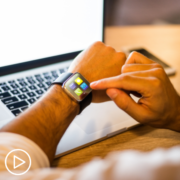What Do Biosensors Mean for Myeloproliferative Care?
What Do Biosensors Mean for Myeloproliferative Care? from Patient Empowerment Network on Vimeo.
Myeloproliferative neoplasm (MPN) patients can benefit from recent advances in medical uses of biosensors. Watch to learn about biosensor medical advances, advantages for MPN care, and future developments from biosensor use.
See More From the MPN TelemEDucation Resource Center
Related Resources:

|

|

|
Transcript:
Though biosensors may be more well-known for their use in testing for food and water contaminants, they have emerged for a variety of medical uses as well. Biosensors may be used by healthcare providers in patient monitoring, screening for infections, health management, and disease treatment.
For MPN patients, biosensors can aid in several aspects of their care. Biosensors can detect viruses and bacterial threats, track exercise levels and body chemistry remotely, detect harmful chemicals, track disease progression, and share health information between patients, providers, and anyone else whom a patient authorizes. All of these biosensor capabilities provide for more precise, personalized, and optimal care for each patient.
As biosensors evolve even more over time, they will continue to help refine healthcare. MPN patients can expect even more personalized care than are already offered, and quality of life during treatment should also improve since biometrics more accurately gauge factors like disease progression and treatment progress.
Please remember to ask your healthcare team what may be right for you.



